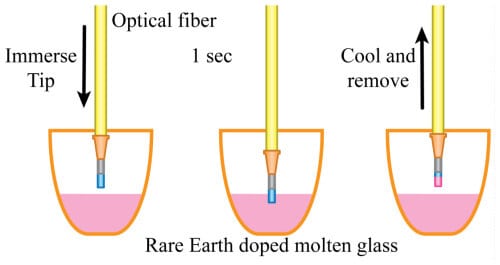University of Adelaide researchers have developed a new optical-fibre based probe, which can measure localised temperature-change deep inside the brain.
Reported in the scientific journal Biomedical Optics Express, the probe will help researchers better understand the brain, its complex and biochemical pathways, and will be used to examine the effects of drug use, where discrete regions within the brain can be impacted at a cellular and even intra-cellular level.
Lead author Stefan Musolino is a PhD candidate in the School of Medicine, based at the ARC Centre of Excellence for Nanoscale BioPhotonics (CNBP). He says there is a requirement for a temperature probe that is both accurate and minimally invasive.
“There is a need to understand how the brain works, whether it be for the testing of new medical treatments or for better understanding the toxicological impacts of drug-taking, which can obviously lead to adverse health outcomes,” Mr Musolino says.
“Using this incredibly thin glass fibre we can track the changes in temperature that we see in the brain, allowing us to better understand what’s happening across the neuronal and inflammatory pathways.
“What our probe provides, is an entirely new method for getting relevant biological measurements out of the brain, in this case rats brains, for further study and analysis.”

“There are large numbers of biochemical pathways in the brain that are linked to acute MDMA-induced hyperthermia,” says Mr Musolino.
“If we can understand how these pathways operate and measure the specific temperature changes taking place, then potential treatments for MDMA toxicity, as well as for other drugs, can be further explored and then tested.”
Dr Erik Schartner, CNBP researcher in the School of Physical Sciences, says: “Our probe is unique due to its tip, which has been expertly functionalised with modified tellurite glass, making it extremely sensitive to temperature.”
“With it, we can measure localised brain temperature to a level of plus or minus 0.1 degrees Celsius. This is important as the brain is the most temperature sensitive organ in the body, and even small deviations in temperature can have a significant effect on wellbeing.
“The probe lets us track temperature change on a real-time basis. We can see how the brain is reacting immediately ─ either to a particular drug such as MDMA, or to a potential treatment.”
The researchers have ambitious plans, intending to continue their research with the current probe prototype, as well as developing an even more capable sensing tool
in the future.
“Our long term strategy is to take this technology and to develop a multi-functional probe that will let us track not just temperature change, but also other biochemical activity in the brain as well,” says Dr Schartner. “This has the potential to turbo-charge research outcomes in the field of neuroscience, greatly aiding our understanding of the brain, the most complex and complicated organ in the body.”

